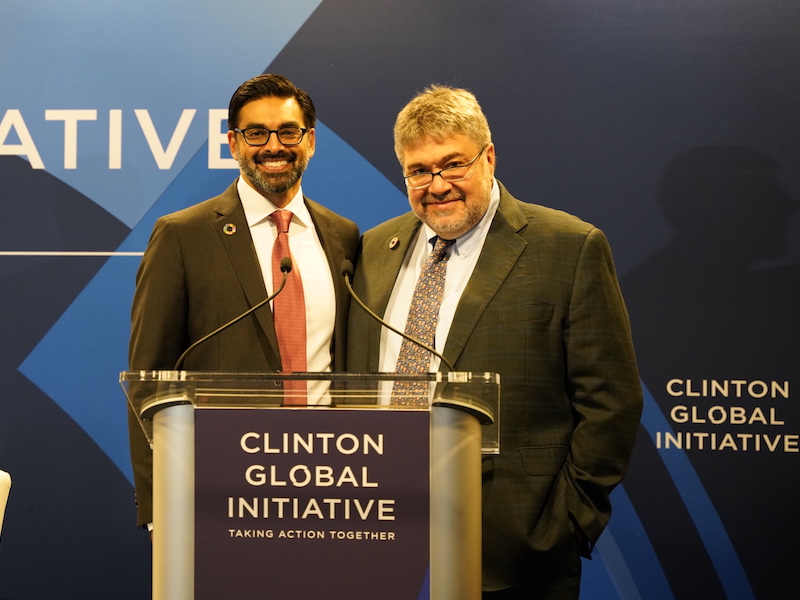global health
OurCrowd launches $200 million health-focused impact investing fund
Impact investing was a theme that appeared throughout the first morning of the two-day Clinton Global Initiative conference.


Aurelio Di Muzio
WHO Foundation CEO Anil Soni (left) with OurCrowd founder and CEO Jon Medved.
OurCrowd, the Jerusalem-based emerging startup investment firm, is launching a $200 million impact investment fund devoted to advancing global health equity.
The fund, announced Monday at the Clinton Global Initiative Meeting in New York City, is OurCrowd’s largest single impact investment project to date. It’s being organized in conjunction with the WHO Foundation, which directs philanthropic dollars to help achieve the goals of the World Health Organization.
The fund is “focusing on breakthrough technologies that are not only going to provide new products and services in therapeutics diagnostics, vaccines, digital health, all of the classic things but also addressing underlying causes that affect health,” Jon Medved, OurCrowd’s founder and CEO, told eJewishPhilanthropy. “We’re dealing with a crisis in health, in climate, in food and many of the solutions are going to come from startup companies.”
Impact investing was a theme that appeared throughout the first morning of the two-day Clinton Global Initiative Meeting, which is taking place for the first time since 2016 and is being held on the sidelines of the United Nations General Assembly. Huge banners at the conference urged attendees — among them prime ministers, corporate executives and heads of large nonprofits — to “commit to action.” Global health equity was among the challenges that former President Bill Clinton outlined in his opening speech, alongside climate change and continued recovery from the pandemic.
“The COVID-19 pandemic ripped the cover off a lot of long-standing health inequities across borders,” Clinton said in the speech. “And even though we haven’t beaten it yet, we’re getting there.”
OurCrowd’s Global Health Equity Fund will invest in approximately 25 to 30 early-stage startups focused on healthcare innovation, as well as agriculture and energy. In order to ensure that the technology reaches low- and middle-income countries, the fund will come with an “access pledge” in which companies will promise to make their best effort to make their products available beyond the developed world.
There’s a direct philanthropic component as well. One-third of the profits the fund generates — as well as one-third of its management fees — will be donated to the WHO Foundation. The foundation will also have an observer on the fund’s investment committee.
“I think this notion of making it easy for people to invest and to donate in the same action, that’s new,” Medved said.
The fund’s access pledge will not require the companies in question to meet any minimum standards or benchmarks; Medved believes that if the pledge were too difficult to fulfill, companies might be reluctant to take the investment. But he doesn’t see the pledge as empty words. Trust is inherent in the investment process, he said, and keeping one’s promises to investors is part of that.
“It’s not a meaningless pledge, it’s a meaningful pledge,” Medved said. “This is a total people business and if you get people who are not straight with you, who make pledges they don’t hold up to, you’ve got more serious problems. We don’t invest once — we invest once, and twice, and some of our companies, we invest in six or seven times.”
The Global Health Equity Fund is the first major impact investing project of the WHO Foundation, a Switzerland-based nonprofit founded in May 2020 during the early months of the COVID-19 pandemic. The foundation’s chief impact investment officer, Geetha Tharmaratnam, told eJP that an increasing number of investors want to make ethical choices, and that technologies with the potential to effect widespread change need capital in order to reach their potential customers.
“There is a big challenge in terms of trying to scale up existing infrastructure and existing systems, and we need to pivot to solutions that are more cost effective, and innovation is part of that,” she told eJP. “Success is not just them growing from where they are right now to two or three times [where] they are right now… It’s really about getting them to be 100 times bigger than they are right now and for that they need to be financially successful.”
OurCrowd has invested previously in companies that make a social impact, from Alpha Tau, a radiation treatment startup, to Beyond Meat, whose plant-based meat emits far less carbon than actual beef. But Medved sees this fund as a decade-long initiative, and hopes it isn’t OurCrowd’s last coordinated impact investment effort.
Tharmaratnam also hopes that funds like these also lead businesses to think about social impact from the moment they’re founded, rather than only after they succeed.
“A more traditional approach to building businesses and especially scaling businesses is to try to grow these businesses to be commercially successful and then after they get to be a very large size, to try and get them to be more considerate with their resources, with the markets that they’re entering,” she said. “We don’t have time for that. That lifespan is too long.”












